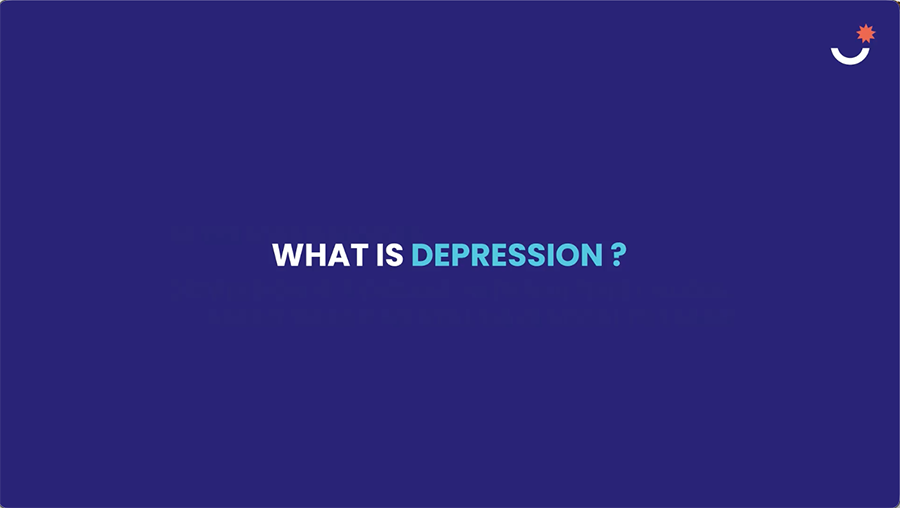Often misdiagnosed, depression is a disease with multiple causes, about which we still have much to learn.
Sadness, dark thoughts, low self-esteem, lost of interest or enjoyment… depression is no mere case of the blues, it is a real disease. It affects all aspects of daily life and is linked to an increased risk of suicide. It can lead to addictions as well as heart disease, diabetes, and sexual disorders.
Many factors come into play in the onset of depression. Vulnerability factors, including having been abused as a child, set the stage. Other factors, referred to as “triggers” precede the onset — for example, a break-up, the death of a loved one, or financial insecurity.
Genetic factors also appear to play a role, suggesting a predisposition. Chronic disease, smoking, an addiction to alcohol or other substances, and even an unbalanced diet can also increase the risk for depression.
≈ 280 million
The number of people living with depression in 2023 Depression is about 50% more common among women than among men.1
+75%
Over 75% of people in low and middle-income countries receive no treatment.1
+700 000
More than 700,000 people die by suicide every year. Suicide is the fourth leading cause of death in the 15-29 age range.1
Neurotransmitters in disarray
In people dealing with depression, the brain’s chemistry is altered. This may manifest as a deficit or imbalance affecting one or more neurotransmitters — molecules that released from the end of a neuron (synapse) and serve as the brain’s chemical messengers. In depression, three neurotransmitters are affected: serotonin, norepinephrine, and dopamine. They help regulate mood and behavior, and their function can be restored with the help of antidepressants.
Symptoms
According to recommendations issued by the World Health Organization and republished by France’s health authority, the Haute Autorité de Santé, in October 2017, “a depressive episode is characterized by the presence of at least two of the three major symptoms (see infographic) for at least two consecutive weeks with a certain degree of severity for each; they must represent a change compared to the individual’s previous state and cause significant distress.”
Usually, depressive episodes go away after several weeks or months, either with treatment or spontaneously. This is referred to as remission.

In 50–80% of cases, a new depressive episode occurs within the next five years after the first one.2 Depression is considered chronic when certain symptoms persist, sometimes in a less severe form, for at least two years.
Available treatments
Psychotherapy is recommended, regardless of the severity of the depression. There are several types of psychotherapy, including supportive, cognitive-behavioral and psychoanalysis-inspired, and several modes, such as individual, family, or group sessions.
Likewise, an individual’s family and friends always play a particularly important role in providing support. Expressing one’s suffering and accepting help are essential to successfully treating the condition.
In addition to psychotherapy, medications, particularly antidepressants, are generally useful or even necessary. Antidepressants are recommended for moderate-to-severe depressive episodes. There are several classes of antidepressants, the majority of which target neurons that secrete serotonin, norepinephrine, or dopamine. They work through various mechanisms that make it possible to increase the available quantity of neurotransmitters or restore neural circuits affected by depression.
The physician will choose the antidepressant that is most suited to the patient’s profile based on their symptoms, known medical history, and previous or current conditions and treatments.
Antidepressant efficacy is generally only noticeable after a few weeks.
There are two treatment phases, or three in the event of relapse:
In most cases, treatment is administered on an outpatient basis (at the patient’s home) with regular follow-up by a health care professional. However, sometimes patients may require urgent care, or the depressive episode may resist traditional medications. In this event, hospitalization might be considered.

About Servier
For more than 30 years, Servier has striven to provide therapeutic solutions for people living with depression.
PREVENTIVE MEASURES TO AVOID RELAPSES
[1] World Health Organization / October 2024/ https://www.who.int/news-room/fact-sheets/detail/depression
[2] Inserm website, Report on depression https://www.inserm.fr/information-en-sante/dossiers-information/depression
